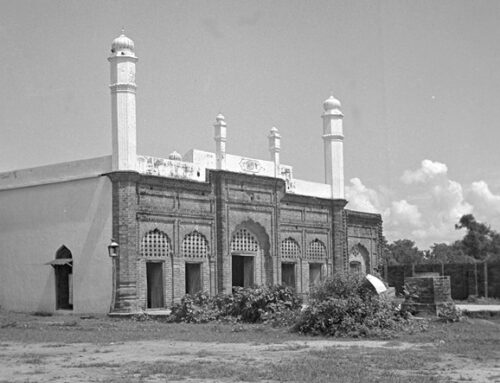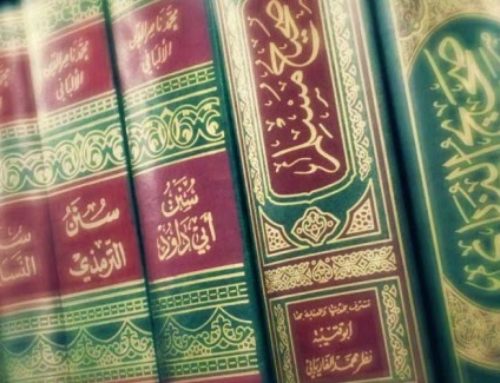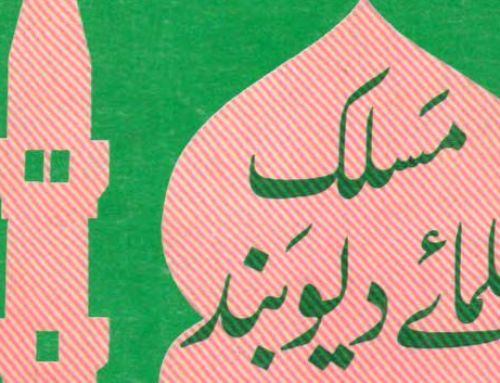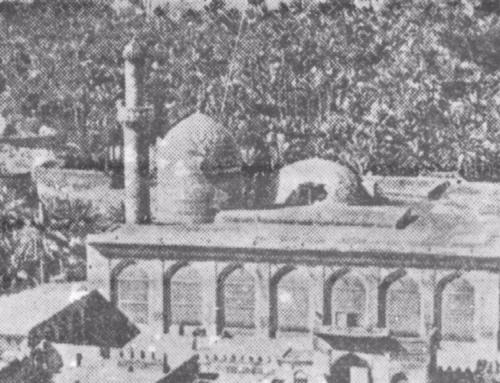Translated by Zameelur Rahman
Question:
Do you say that the knowledge of the Prophet (upon him be peace) is limited only to the laws of the Shari‘ah or was he given knowledge pertaining to the Essence, Attributes and Acts of the Maker (Exalted is His Name), the hidden secrets (al-asrar al-khafiyyah), the divine judgement (al-hukm al-ilahiyyah) and other than of that of which none from creation, whoever he may be, reached the pavilions of his knowledge?
Answer:
We say with the tongue and we believe in the heart that our master, the Messenger of Allah (Allah bless him and grant him peace), is the most knowledgeable of all creation, with sciences pertaining to the Essence and Attributes [of Allah], legislations (tashri‘at), of the practical rules and the theoretical rules, the true realties and the hidden secrets, and other sciences, that none from creation reached the pavilions of his courtyard, neither an angel brought nigh nor a messenger sent.
Indeed he was given the knowledge of the first and the last and Allah’s grace upon him was immense (Qur’an 4:113). However, this does not entail knowledge of every particular from the temporal matters in every moment from the moments of time, such that the concealment of part of it from his noble vision and his exalted knowledge harms his (upon him be peace) being the most learned of all creation, and [harms] the extensiveness of his knowledge and the excellence of his cognizance, even if one other than him from creatures and servants becomes cognizant of it. Sulayman (upon him be peace) being the most learned [in his time] was not harmed by the concealment [from him] of what Hudhud had comprehended of strange incidents, as it says in the Qur’an, “He said: I comprehend that which you do not comprehend and I have brought to you a sure information from Sheba” (Qur’an 27:22).
Question:
Do you believe that Iblis, the accursed, is more knowledgeable than the Chief Existent (upon him be peace) and has more expansive knowledge than him in absolute terms? Have you written this in a book? And how do you judge one who believes this?
Answer:
A review of this issue preceded from us, that the Prophet (upon him be peace) is the most knowledgeable of creation in general, of the sciences, the judgement, the secrets and other than that from the Kingdom of the Horizons, and we believe with certainty that one who says that so-and-so person is more knowledgeable than the Prophet (upon him be peace) has disbelieved. Our elders have given the verdict of disbelief for one who says that Iblis, the accursed, is more knowledgeable than the Prophet (Allah bless him and grant him peace), so how is it possible that this matter is in a certain book we authored?
However, the concealment of some insignificant particular things from the Prophet (upon him be peace) due to his inattention to it does not cause any defect in his (upon him be peace) being the most learned once it is established that he is the most knowledgeable of creation of the noble sciences that are fitting to his lofty station, just as cognizance of most of those insignificant things due to the intensity of Iblis’s attention to them does not cause glory and perfection of knowledge in him, since this is not the criterion of virtue. Hereof, it is not correct to say that Iblis is more knowledgeable than the Messenger of Allah (Allah bless him and grant him peace) just as it is not correct to say about a child who knows some particulars that he is more knowledgeable than an erudite research scholar in the sciences from whom those particulars are hidden. We have recited unto you the story of Hudhud with Sulayman (upon our Prophet and upon him be peace) and his statement, “I comprehend that which you do not comprehend.” The records of hadith and the books of tafsir are replete with abundant examples of this which are well-known amongst people.
The physicians are agreed that Plato and Galen and their likes are from the most knowledgeable of physicians about the qualities of diseases and their states, despite their knowledge that maggots are more knowledgeable about states of filth, their taste and their qualities. Hence, the absence of Plato’s and Galen’s knowledge of these despicable states does not harm their being the most learned, and none from the intelligent and the stupid will be satisfied with the view that maggots are more knowledgeable than Plato, although they have more extensive knowledge than Plato about the states of filth. The innovators of our lands affirm for the blessed prophetic soul (upon it a million greetings and peace) all the sciences of the base lowly things and the lofty virtuous things, saying that since he (upon him be peace) was the best of all creation, it is necessary that he possesses all of those sciences, every particular and every universal. We rejected the establishment of this matter using this corrupt analogy without a proof-text from the relied upon texts. Do you not see that every believer is more virtuous and more honourable than Iblis so following this logic it would be necessary that every person from the individuals of this ummah possesses the sciences of Iblis, and it would be necessary that Sulayman (upon our Prophet and upon him be peace) knew that which Hudhud knew, and that Plato and Galen knew all the knowledge of maggots? These concomitants are absurd in their entirety as is obvious.
This is a summary of what we said in al-Barahin al-Qati‘ah in order to sever the veins of the foolish deviants and break the necks of the forging deceivers. Hence, our discussion about it was only in regards to some of these temporal particulars, and for this reason we used the demonstrative noun to indicate that the objective in affirmation and negation there was those particulars, and nothing besides [them]. However, the iniquitous distort the speech and do not fear the reckoning of the Knowing King. We are certain that those who say that so-and-so individual is more knowledgeable than the Prophet (upon him be peace) is a disbeliever, as more than one of our respected ‘ulama stated. And whoever concocts about us that which we did not say, upon him is [the burden of] proof, [and he should] fear the interrogation before the Recompensing King. Allah is witness over what we say. [1]The following is a translation of a section from Shah Waliullah al-Dehlawi’s al-Tafhimat al-Ilahiyyah which bears some resemblance to Mawlana Khalil Ahmad al-Saharanpuri’s argument above as it … Continue reading
Al-Muhannad ‘ala l-Mufannad ya‘ni ‘Aqa’id ‘Ulama Ahl al-Sunnah Deoband, pp. 55-60
| ↑1 | The following is a translation of a section from Shah Waliullah al-Dehlawi’s al-Tafhimat al-Ilahiyyah which bears some resemblance to Mawlana Khalil Ahmad al-Saharanpuri’s argument above as it addresses a similarly erroneous reasoning. Shah Waliullah critiques the view that the Prophet (peace and blessings be upon him) must have already acquired all perfections simply because their absence would entail an imperfection. In giving his answer, he states specifically that the special attributes of Allah like ‘ilm al-ghayb must be negated from all Prophets, and this does not entail imperfection. He also mentions that attributes that are outwardly “perfections” are often found in lesser creatures, although they are absent in the Prophet (peace and blessings be upon him), a point also articulated by Mawlana Khalil Ahmad al-Saharanpuri.
“A speaker said: He (Allah bless him and grant him peace) has no awaited perfection (kamal muntazar), rather all perfections have already been acquired by him (Allah bless him and grant him peace). If we study this from the perspective of the outward sciences, we would say: “Perfection is a quality for which its bearer is praised. There are many qualities that the authentic hadiths indicate that he will acquire on the Day of Resurrection, like intercession (shafa‘ah), praise (hamd) in the manner cited in the hadith, and whatever blessing Allah promised him in the Garden. There is no doubt that these are perfections and they have not yet been acquired. Rather, he was promised them. “If it is reasoned that if he does not have something that is possible for him to have, it would entail imperfection (naqs), we say: The imperfection that is negated is to characterise him with sins and defects. Why not, when Allah perfected for him his religion (Qur’an 5:3) and opened for him a clear opening (Qur’an 48:1) towards the end of his life, although he was not characterised by imperfections neither before this nor after it? Why not, when Allah gave preference to some Prophets (upon them be peace) over others, so the more virtuous (fadil) must have a perfection that is specific to him and not present in the less virtuous (mafdul), though the less virtuous is not imperfect? Moreover, it should be known that it is necessary to negate from them [i.e. the Prophets] the attributes of the Necessary (Exalted is His Glory) like knowledge of the ghayb (‘ilm al-ghayb), power over the creation of the world etc. and this is not an imperfection. “It is established the Prophets (upon them be peace) were characterised by hunger, thirst, poverty, needs etc. and these are not imperfections. That he (Allah bless him and grant him peace) is not characterised by qualities for which people are praised in some of their affairs like calligraphy, poetry etc., due to the establishment [in him] of that which is more honourable and more virtuous than them, is not an imperfection. “In sum, the meaning of ‘imperfection’ is not the absence of a perfection that is prepared for him in the future, or [the absence of a perfection that] is [found] within the general condition of his class, or his close species, or his distant genus, or a more general existent from the necessary and the possible, or even [the absence of a perfection that is found in] that which is legally and customarily considered blameworthy. “If His (Exalted is He) statement ‘I perfected your religion for you and completed My favour unto you’ (5:3) is adduced as proof, we say: Perfection in religion is that a ruling will not be abrogated thereafter, nor will anything be added to it, and the meaning of completion of favour is that they [i.e. the ummah] were honoured and preferred over those besides them in the manner of His (Exalted is He) statement in the story of Yusuf (upon him be peace) ‘and He completed His favour unto you’ (12:6). Moreover, the address in this verse is not restricted to him (Allah bless him and grant him peace), rather it is to him and to his entire ummah. Thus, if it were to prove that he does not have an awaited perfection, it would entail the very same thing for his ummah, which is meaningless. If his (peace and blessings be upon him) statement ‘everything was manifested to me’ is adduced as proof, we say it has the same application as His (Exalted is He) statement about the Torah, ‘[it is] an explanation of all things’ (6:154, 7:145). The default rule in generalities is specification for that which is fitting.” (Al-Tafhimat al-Ilahiyyah, 1:24-5) |
|---|







Subhanallah. What a beautiful, befitting answer. Truly the people of Bida’ will never be able to fulfill their nefarious plans, Inshallah.
Wa salamu `alaykum.
salam u alaykum. how come does the statement of imam shah wali ALLAH resemble that of maulana khalil in baraheen al qatea? furthermore imam shah wali ALLAH dehlavi made no statement at all that can be called as objectionable!
MashaAllah. Very precise response and refutation. Much of the allegations were taken out of context and the rest completely false with no basis at all. I wonder if the thought and fear of Allah(swt) never passes their heart even once before they choose to slander another muslim brother.. let alone a scholar, an ulama-e-deen. May Allah guide them to the right Deen brought by Rasoolullah(saw.)